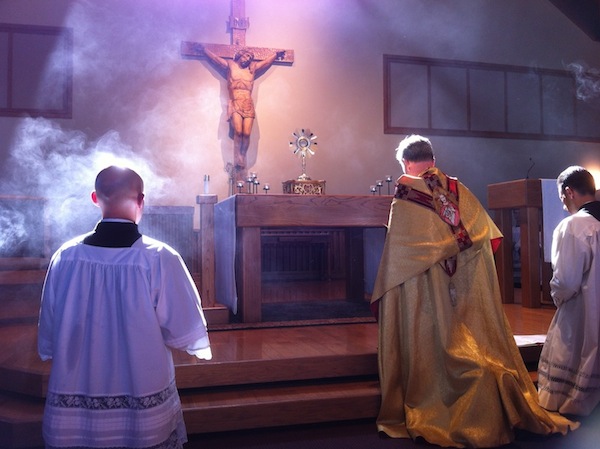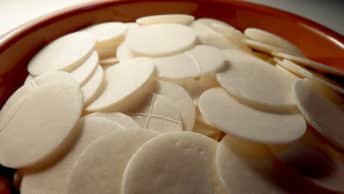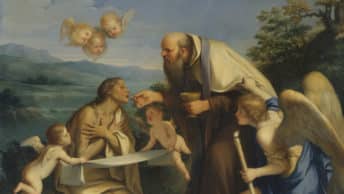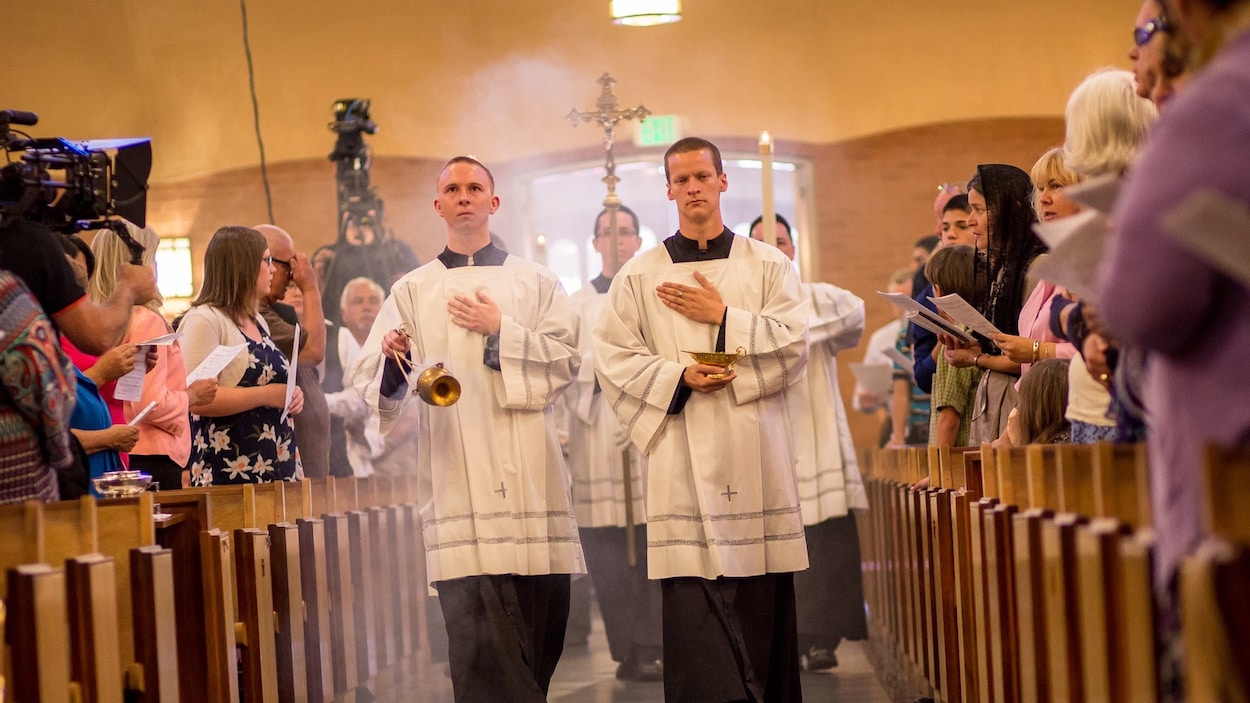
In your imagination I’d like to take us on a trip back to the Upper Room somewhere in Jerusalem. It’s nighttime and there is a tense, ominous silence in the dark streets. Covering it all is the looming shadow of the Roman Emperor, the overwhelming presence of the military force of Rome’s legions. The dark despotism of Rome’s enforced peace could erupt anywhere and any time. Trapped men would lash out in frustration and bitterness. The grinding intersection between dominative power and man’s legitimate desire for freedom was wearing thin. It was in this context that Jesus Christ met with His twelve disciples to freely hand over to them His very self in the form of His body and blood, both of which were about to be sacrificed to deliver us from the false gods of dominative power.
How many would say that what Jesus was doing was relevant to the situation that was surrounding him? Moreover, how many would say that what we are doing here in this hour on this Sunday is relevant to the situation that surrounds us in the world outside? The questions are connected. By being here we are re-entering that same Upper Room to share in that same Lord’s Supper in contexts that are very much the same.
Outside today is a world of political corruption, of lies and deceit, of military and civil violence… a world wherein trapped men and women can lash out anywhere at any time in order to try to be free of the forces that imprison them. It is a world in which a powerful few control the lives and destinies of many…in which a wealthy few live at the expense of the many who have relatively little wealth. The frustration flashes out at us in many accounts of violence that come to us on a daily basis. In that same world many governmental officials seem more interested in the acquisition of greater personal power while being little interested in giving citizens protection from the violence that surrounds and traps them. In other words, the parallels between what is occurring in our own culture and what occurred in the Roman culture of Christ’s time are uncomfortably similar. Pagan Rome and secular America are the contexts that surround the Lord’s Supper.
And so it is that the greatest need of the twelve disciples, and our greatest need also, is to find the strength to out-live and to out-love (and thereby transform) the world that imprisons us. And this is precisely what Jesus is doing even in our world today.
There is great power in a person who does God’s will, who lives in God’s love, and who follows a divine logic that is different from the logic of this world. There is great power in one who lives in honesty and truth, who lives in the innocence of a clean conscience, and who thus gives himself or herself the strength of self- sacrificial love for others. The broken body of Christ and His poured out blood become the sources of that sort of power, a power that is able to transcend that of this world’s, a power that drains the world’s use of dominative power and renders it weak and impotent. That is the relevance of being here today, during this hour each Sunday. We are here, as were the twelve disciples, to receive a power that integrates us into God’s power, a power that allows us to go through a door that frees us from the prison of this world’s lust for power that only manipulates, dominates, crushes, devours, and destroys.
Secondly we are here to judge the world. In Jesus Christ God has judged the world. He has shown us the relative value of things. His judgment shows us what things are better than others. And when we find Jesus kneeling with a towel around His waist washing the feet of His disciples, and when we encounter Jesus coming to us in mere bread and a few drops of common wine, handing Himself over to us in utter simplicity and humility in the quiet invitation of love rather than in the domination of brute power, then we see that both we and our world are judged. Pride is judged. Acquisitiveness is judged, and manipulative power is judged. Control of others is judged. Domineering selfishness is judged. Lying, conniving officials in government, in business, and in labor unions are all judged.
In other words, by participating in the Lord’s Supper we are acting as witnesses. Over and against the standards of this world we proclaim something that is highly significant by sharing together this hour. St. Paul tells us: As often as you eat this bread and drink this cup, you proclaim the Lord’s death until he comes again in glory. The celebration of Holy Mass, set as it is in the middle of the course of ordinary human events, stands as a judgment. It is a measuring ruler whereby we judge the relative value of things, whereby our world’s values are measured against God’s, and whereby we declare that the Cross is planted in the center of our universe and that it penetrates down through all of the levels of our political, social, and economic lives to the very core of what it means to be a human being. We proclaim that we are all endowed by our Creator with certain rights that cannot be given away, namely freedom, pursuit of truth, and pursuit of God. In such a light many things that men and women do each week, particularly those who have and use dominative power, are revealed to be shabby, pitifully mean, and demonic.
To say it in another summary way, our participation in the Holy Sacrifice of the Mass is a very relevant act because it is a judgment that saves us even as it searches and summons our hearts and the consciences of all men and women.
Finally this Hour is very relevant to all of the hours of each week because it frees us from the prison of time and allows us to walk through a door that leads us into eternity. After all, time is merely the measurement of what is passing. All about us people (and, yes, we along with them) are in a mad pursuit of what is merely passing. We do everything we can to save time…only to to waste it. This leads many into a pervading sort of cynicism and frustration that makes them question whether there is anything at all that can be called eternal.
The Roman culture that surrounded Christ, with its dominative power, its corrupt values, and its lust for what is merely temporal produced cynical citizens. Everywhere on the gravestones of Romans was found the following inscription: NON FUI, FUI, NON FUI, NON CURO. “I was not, I was, I am not, I do not care.” What could be more hopeless, more cynical and a more empty way to bury your wife, your child, or your husband. What could be a better inscription over the grave of a trapped and victimized man than to say: “I was not, I was, I am not, and I do not care!” Is this an expression of strength or of power? No! It is the expression of surrender, of despair, and of a soul that has been seduced and raped by the values of a culture that views religion and Christ as irrelevant.
This is the Feast of Corpus Christi and each celebration of the Eucharistic Liturgy is another moment that allows us to enter the Upper Room and share once again in the everlasting Lord’s Supper and His one sacrifice that is the Last Supper because it’s still going on. Each Mass is a highly relevant hour in all of the hours of each week. Each Mass is an event in which we receive power, in which we find judgment, and in which we touch the eternal. What could be more relevant than that? Corpus Christi is food indeed and His blood is drink indeed. The Upper Room, the Lord’s Supper, Holy Mass is a place which unlocks for us the secrets of spiritual power, of human dignity and freedom… of true values, of eternal hope and the secret of walking through life with our heads held high, filled with strength, filled with purpose for living and reason for dying.
May the Body and Blood of our Lord Jesus Christ bring you, and bring me with you, into His everlasting life.







